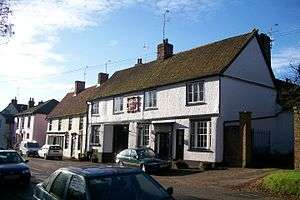Much Hadham
| Much Hadham | |
 Much Hadham |
|
| Population | 1,994 (2001 census)[1] |
|---|---|
| OS grid reference | TL426208 |
| Civil parish | Much Hadham |
| District | East Hertfordshire |
| Shire county | Hertfordshire |
| Region | East |
| Country | England |
| Sovereign state | United Kingdom |
| Post town | Much Hadham |
| Postcode district | SG10 |
| Dialling code | 01279 |
| Police | Hertfordshire |
| Fire | Hertfordshire |
| Ambulance | East of England |
| EU Parliament | East of England |
| UK Parliament | Hertford and Stortford |
|
|
Coordinates: 51°51′14″N 0°04′19″E / 51.854°N 0.072°E
Much Hadham is a village and civil parish in the district of East Hertfordshire, Hertfordshire, England, formerly known as Great Hadham. It is situated on the B1004 road, midway between Ware and Bishop's Stortford. At the 2001 census the population recorded was 1,994.[1]
History and description
The village is stretched along its mile-long main street (High Street, Tower Hill and Widford Road) which runs along the river Ash. Few retail outlets remain apart from two public houses, a small supermarket with a post office, a hairdresser, two garages and a nursery. Recently the radio shop next to the Red Lion closed, though 'Much Hadham Radio Ltd' is still operating. In the High Street, residential house names show former commercial or public use, e.g. "Old Bakery", "Collarmaker's House" and "The Forge" Museum, although this last still incorporates a working forge. The village's station on the Buntingford branch line closed in 1964 under the Beeching Axe.
There is a Church of England maintained primary school and two churches: the parish church and a Congregational church. Much Hadham's parish church, built largely between 1225 and 1450, is shared between the St. Andrew's Church of England (Anglican) congregation and the Holy Cross Roman Catholic congregation. The entrance to the church is adorned with two sculptures by Henry Moore, who lived in the nearby hamlet of Perry Green until his death in 1986.
Adjacent to the church is a palace that was the country home of the Bishops of London for 800 years. It may be that the Tudor dynasty began here, for Henry V's widow, Catherine of Valois, (Shakespeare's Katharine) gave birth here[2] (or at similarly named Hadham in Bedfordshire) to Edmund Tudor, 1st Earl of Richmond, whose son Harry won the throne at Bosworth Field.

The Red Lion coaching inn, now converted into private houses, has been in the village since the 15th century. It was a stopping point on the old road from London to Cambridge. Legend has it that the inn is connected to St. Andrew's by a tunnel, possibly built during the time of Oliver Cromwell as an escape route for the clergy. The skeleton of an 18-year-old woman was discovered bricked up in a fireplace in the inn. It is thought she died after being incarcerated some time during the 19th century.
The Henry Moore Foundation can be found in Perry Green. In December 2005 one of the sculptures on display was stolen from the site by opportunistic thieves.
Other celebrity residents have included Bob Monkhouse, The Pet Shop Boys, Chas & Dave and Bob Carolgees. Moor Place is a Grade I listed Georgian manor house, formerly owned by Montagu Norman, Governor of the Bank of England from 1920 to 1944 and Ronald Norman, chairman of both the BBC and London County Council.
The village has an active sports association which includes Much Hadham Football Club and Hadham Villa Football Club.
Much Hadham Cricket Club (founded in 1889) withdrew from the Herts & Essex League in 2007 and no longer exists. Sawbridgeworth Cricket club have used the cricket facilities since then.
See also
References
- 1 2 "Much Hadham CP". Census 2001: Neighbourhood Statistics. Office for National Statistics. Retrieved 9 June 2010.
- ↑ "Sir Edmund Tudor, 1st Earl of Richmond". Retrieved 10 August 2013.
External links
| Wikimedia Commons has media related to Much Hadham. |